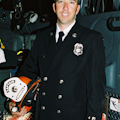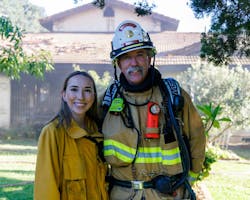What does it take to get hired by a fire department? Dozens of written exams, oral exams, physical exams, travel expenses, hours waiting in lines and anticipation of whether you will make the cut to climb the ladder rung.
These are the trials and tribulations that all people face when they decide to pursue the fire service. They aren’t without many anxious days and sleepless nights waiting patiently for a phone call, letter or postcard and/or verbal confirmation that they can continue. True, the amount of energy and effort to make the cut is exhausting, yet at the same time it’s rewarding. The chance to achieve a dream is the opportunity that all candidates fantasize about at this stage in the process.
However, after that opportunity emerges, the real work begins.
Specific guidance
Yes, you made it through the long process—including the final oral interview, when you sold yourself as the firefighter candidate that you said that you will be for the department that picked you—but it’s important to not forget the hard work that you put in to get to this point. As a probie, you will be challenged, stressed, doubted and feel forsaken sometimes, but it’s the desire to press forward that your peers want to see from you. Nerves at this stage of the process mean that you care. If you aren’t feeling nervous, then you weren’t committed to a firefighting career to begin with.
This is your time to shine, and you won’t grow beyond what you are unless you face the rest of your career with the tenacity that you put forth during the hiring process. To put it one way, you will start to oxidize. Challenges will begin each shift and at every turn.
Paying respect
The most important start to any fire service career is your verbal etiquette when others approach you. “Sir” or “Ma’am” most definitely will save your career. Those individuals who you walk among earned the respect to be addressed appropriately. You must leave your educational experiences of using the terms Mr. and/or Mrs. in the educational setting.
Furthermore, this doesn’t conclude at the end of the day on which you start your fire service career but carries throughout your career until the final bell.
It isn’t about accolades
The qualities and characteristics that helped you to arrive at your first day on the floor are the same traits that will carry you through probation. However, the idea that you “arrived” isn’t the ideology that serves the team. Stress that you experience every time that you give a company drill, train on operational objectives and respond to unfamiliar emergency calls is good. There is no magic book that has all of the answers. Real-life experiences are what will be catalogued in the mental Rolodex.
Each time that you finish a station task, drill, emergency call, etc., it’s OK—even beneficial—for doubt to creep into your mind. You will ask yourself, “Did I do everything correctly? Did I do enough to impress my captain? Why didn’t my crew say, ‘Good job?’ Am I useful or am I at the wrong department?”
You took an oath to serve. Every time that the bell rings, you owe it to yourself, to your crew and, particularly, to the citizens who you serve to do your best.
As a probie, you might feel as though you haven’t achieved that status to receive a “good job” from your coworkers. Remember, you don’t serve to get accolades. You serve because you don’t need accolades. Awards and medals don’t define you or what you’re doing. You are a valuable member in the department, because you eventually will become the next mentor. Before you realize it, you will be in a new position, possibly a supervisory position. You will be the one who imparts your slide carousel to the next generation.
You are invaluable
Many times, if not all of the time, you will feel forsaken. You will question your importance to the organization and, particularly, your crew. What offsets this is the feeling that you get when a job is well done. A simple “thank you” or smile from a concerned patient and/or family member is the reward. Yes, a pat on the back goes a long way, but you didn’t become a firefighter to get a pat on the back.
What drove you to pursue this career is service. Every career, in a small way, is service to someone or something. If in the act of service you sacrifice your life, you have given the ultimate gift, but only team members recognize what you do as a probie. They all experienced the same journey, and they do respect you.
As a probie, you are an invaluable person and, more or less, an unspoken leader of the team. You might not realize it, but older members of the department will rely on your knowledge of new training techniques and all specifications.
So, don’t think that you have all of the answers. Thus far, you have only done enough to step through the door of your new department.
Don’t complain, swear, fake it, ask why or get angry from criticism or constructive feedback, and, in particular, don’t quit. You joined the best team in the world, and you now hold a starting position. You aren’t on the sidelines anymore. You are no longer a bench warmer. When the bell rings, you respond to the scene as a professional firefighter. Those who are in need see a group of individuals who will solve a simple or complex problem. You answered the call.
About the Author

Shawn Drake Morton
Shawn Drake Morton is a division chief for Monrovia, CA, Fire & Rescue, with which he has served since 1994. He entered the fire service as a volunteer in 1989. Morton has a bachelor's degree from California State University-Long Beach and has written multiple grants for his department. The most prominent grants involved receiving a Type I tactical water tender and Plymovent Exhaust System for each station.
